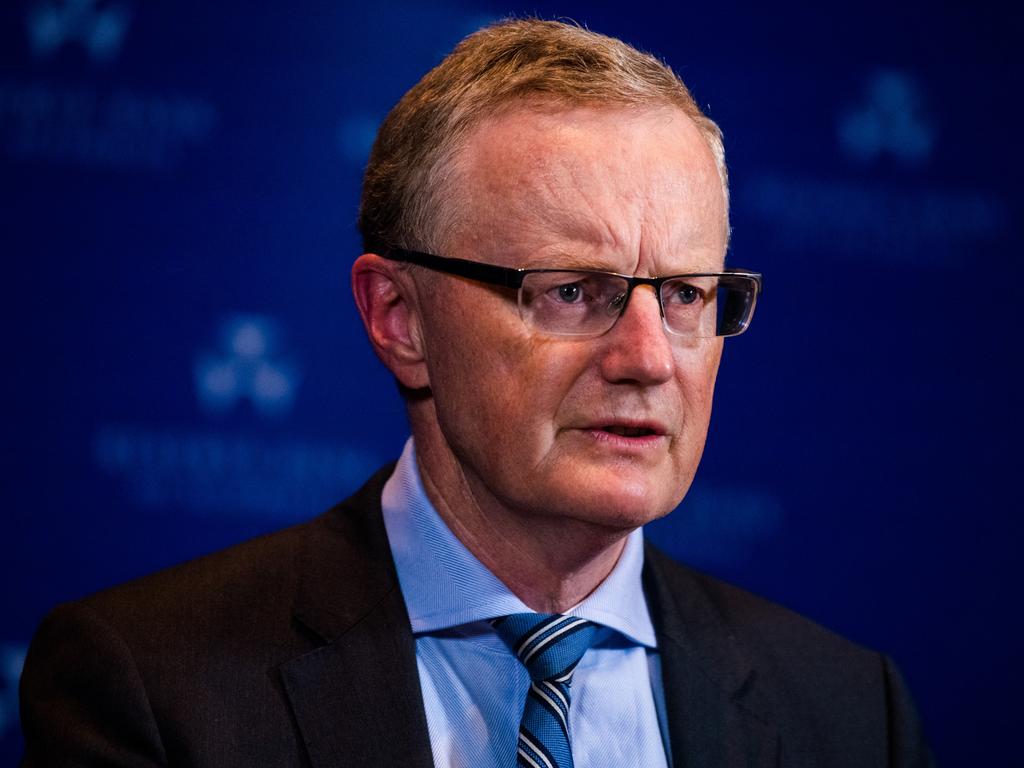Inflationary ‘storm’ to pass us by: Reserve Bank governor Philip Lowe
Australia will not be sucked into a ‘perfect storm’ of global inflationary pressures, Reserve Bank governor Philip Lowe says.
Reserve Bank governor Philip Lowe says Australia will not be sucked into a “perfect storm” of global inflationary pressures and a forecast gentle lift in wages means it is “plausible” rates will not rise before 2024.
In a speech to the Australian Business Economists on Tuesday, Dr Lowe again hosed down suggestions that the central bank would have to tighten monetary policy as soon as next year, despite a surge in consumer prices and wages in countries such as the US.
His benign view of inflation and rates comes as cost-of-living pressures emerge as an early battleground ahead of a federal election that must be held by May. After Scott Morrison said petrol prices would be lower under a Coalition government, Finance Minister Simon Birmingham on Tuesday conceded “we don’t set global oil prices”.
Senator Birmingham, however, continued to hammer home the government’s record on hip-pocket issues. “Under the Liberal and National parties: lower taxes, lower electricity prices. Under the Labor Party: higher taxes, higher electricity prices. That’s the lived experience in Australia,” he said.
Opposition Treasury spokesman Jim Chalmers said “the most important thing when it comes to the rising costs of petrol on Scott Morrison’s watch – or the interest rates that the Reserve Bank has said will obviously go up at some point in the future given they can’t stay at zero forever – is wages growth”.
“The government’s own budget said … the wages of working families will not keep up with the rise in the cost of living,” Dr Chalmers said.
Dr Lowe said Covid’s impact on the global supply of goods such as semiconductors, cars and electronics would be temporary. He said the worldwide surge in demand for goods – which had compounded the supply issues – would rebalance towards spending on services as economies opened up.
“Although there is some uncertainty, it is likely that inflation from these sources will moderate over the next 18 months,” he said.
The RBA’s economists expect wages growth will lift from 1.7 per cent to 2.5 per cent next year and then to 3 per cent by the end of 2023. Underlying inflation, which strips out more volatile items such as petrol prices, which have surged over the past year, is predicted to climb from 2.1 per cent to 2.5 per cent – and the middle of the RBA’s 2-3 per cent target range – over 2023.
In the US, in contrast, consumer price growth of more than 6.2 per cent has been accompanied by a 5 per cent jump in pay.
Dr Lowe said “it is likely that wages will need to be growing at three-point-something per cent to sustain inflation around the middle of the target band”. As such, the labour market was “critical” to whether the Covid-related price pressures became entrenched in Australia.
“It is unusual to have persistently higher inflation without persistently higher wages growth,” he said. “The two generally go together. There have been historical exceptions to this, and other factors that affect firms’ costs and mark-ups can have persistent effects. But at the current juncture, the labour market is the key.”
Dr Lowe said he would be prepared to “look through” a jump in inflation that was not driven by a sustainable lift in pay. “If wages are only growing at 2.5 per cent, we are not going to have an inflation problem in this country.”
Innes Willox, the chief executive of national employers association Ai Group, said “our expectations are not significantly different to those of the Reserve Bank”. “While there have been wage surges in some occupations and locations recently, we do not expect a sudden increase in wages growth,” Mr Willox said.
“There is a lot of spare capacity in the labour market. Effective rates of unemployment are much higher than the official rate and underemployment is high. In addition, we are expecting a reopening of the country to skilled migrants, backpackers and students, and these will address some of the particular labour shortage issues.”
He said there was “no sign of an imminent increase in productivity growth and this will cap real wage rises”.
Dr Lowe said fiscal policies in other countries such as the US and Britain “were less successful than Australia’s JobKeeper program in maintaining the attachment between businesses and employees”. “The result has been a significant shock to labour supply in the US” that had exacerbated wages pressures. “This has not been the case in Australia.”
Inflation expert Tamar Hamlyn, who helps manage $24bn in bonds at Ardea Investment Management, warned that it would be unusual were Australia to be completely sheltered from the global inflationary storm.
Mr Hamlyn noted that Dr Lowe had flagged the particularly elevated level of uncertainty around the future path of consumer prices and wages.
“Any time you take a strong position that Australia is different from the rest of the world, you are setting yourself up to have to revise your opinion down the track,” Mr Hamlyn said.
“When inflation is rising rapidly in the US and UK, and perhaps starting to rise in Europe and also potentially in Asia, you have to ask yourself what is so different about Australia that we can have a materially different outcome.”








To join the conversation, please log in. Don't have an account? Register
Join the conversation, you are commenting as Logout